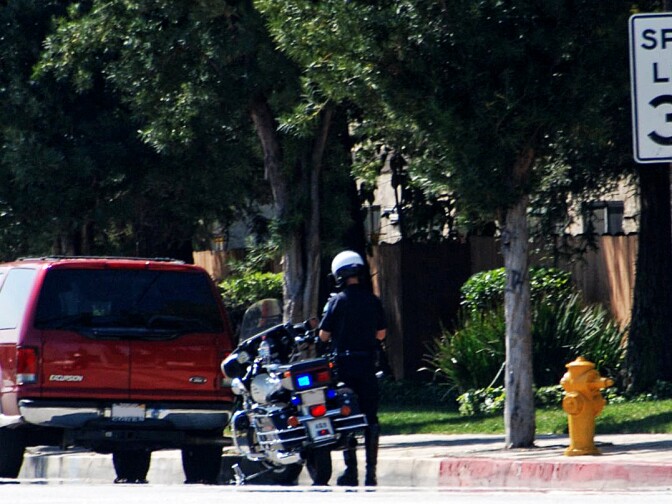This story is free to read because readers choose to support LAist. If you find value in independent local reporting, make a donation to power our newsroom today.
This archival content was originally written for and published on KPCC.org. Keep in mind that links and images may no longer work — and references may be outdated.
California traffic courts hit poor, minority drivers hardest, report finds
Blacks, Latinos and California's poor are disproportionately affected by driver's license suspensions and arrests in California that are the result of unpaid traffic tickets, according to a new report.
For low-income residents, the inability to pay the initial fines can lead to mounting penalties and court assessments, driving them deeper into poverty, landing some in jail for nonpayment and making it harder for them to obtain and keep their jobs or their homes.
For those who are already barely making ends meet, a single traffic citation can snowball into something much worse.
A base fine can quickly balloon to $490 after additional penalties and fees are added, said Antionette Dozier, senior attorney with the Western Center on Law and Poverty and a co-author of the report.
If a person misses a court date or simply can't pay up by the due date, the cost can spike to $815, and continue rising from there.
"For a person who's very low income, who may be unemployed, who may be living on public assistance, on SSI because of a disability or because they are elderly, they can't afford these payments," she said.
If fines don't work, the court can issue an arrest warrant or tell the DMV to suspend the person's license, and it will likely do so without asking whether the person didn't pay because they were unable or because they were unwilling, Dozier said.
"We've had many clients who have told us that they'll go to the collection agency to try to make payment arrangements, and the arrangements that are made, and plans that they're pushed into, are most often not plans that they can complete," she said.
Across the board, people with lower incomes are hurt the most, but the report's authors found that blacks and Latinos are also more likely than whites to end up arrested or jailed for driving on a suspended license after failing to appear in court or pay a fine.
In Los Angeles County, black residents are three and a half times more likely to be arrested for failure to appear or failure to pay than white residents, Dozier said.
"But when you look at the zip codes where people are impacted, where the percentage of black residents are above 20 percent, you also realize that those are low-income communities, communities like Compton, and Inglewood, and East L.A., where black and Latino residents make up the majority of the neighborhood population," Dozier told KPCC.

(See the report's interactive map comparing areas with high driver's license suspensions and areas that have more African-Americans, Latinos and lower-income residents.)
Overall, L.A. County's black residents represented more than 33 percent of the arrests for driving on a suspended license, despite making up only about 9 percent of the county's population.
For Latinos, the disparity was not quite as stark, but it was still troubling, Dozier said. Latinos make up about 48 percent of the population but account for 55.2 percent of such arrests.
Dozier said the group found that racial profiling and over-policing in part helped to explain why black and brown communities are hit hardest.
In addition, she said, the cost of traffic tickets in California has skyrocketed in recent years in order to help fund the court through fines and fees.
Both factors have contributed to the racial and economic disparity in the arrest rate, she said.
And yet, Dozier said, between court costs and the cost of putting people in jail, expensive tickets and fines don't even manage to make much money for the state.
"We're all paying for this policy that doesn't work. And our courts are not better off, they're not funded, because these residents simply cannot pay. It's not that they're unwilling — but they simply cannot pay," she said.
The report was put out by a coalition of attorneys and advocacy groups in the East Bay, which in addition to the Western Center, included A New Way of Life Re-Entry Project, the East Bay Community Law Center, Lawyer's Committee for Civil Rights of the San Francisco Bay Area and Legal Services for Prisoners with Children.
A similar report last year found that more than 4.2 million people across California got their licenses suspended for failing to fight or pay a traffic ticket.
In the new report, Dozier said, the group dug deeper into the numbers, drawing from U.S. Census data and information from the Department of Motor Vehicles, to find that black and Latino residents together face suspension for failing to pay traffic citations at five times the state average.
A group of lawmakers have pushed a bill that would repeal the practice of suspending a license for failing to pay or appear in court, Dozier said.
Senate Bill 881, sponsored by state Sen. Robert M. Hertzberg, D-Van Nuys, would also restore licenses to people with existing suspensions.
Clarification: This story has been updated to make it clearer that the cost of traffic tickets has gone up, rather than the ticketing system.









